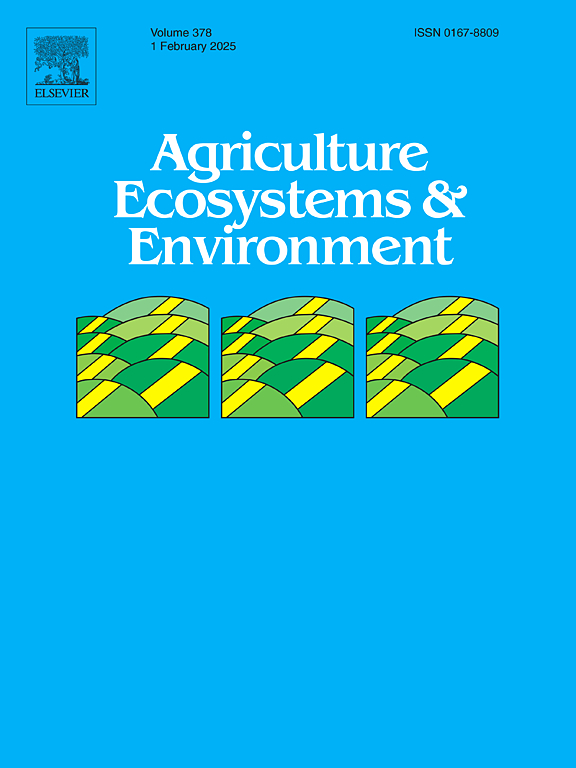Green manuring combined with optimal water management achieves a triple-win for paddy soil quality, rice productivity, and environmental benefits
IF 6
1区 农林科学
Q1 AGRICULTURE, MULTIDISCIPLINARY
引用次数: 0
Abstract
Green manuring significantly increased rice yield and soil carbon (C) stocks, however, improper farming practices may result in elevated methane (CH4) emissions. This study investigated the effects of optimizing water management after green manure incorporation on soil quality index (SQI), rice productivity, C Footprint, net ecosystem economic budget (NEEB), and comprehensive evaluation index (CEI) over a 2-year period in a rice-green manure rotation system. A field experiment was conducted including five treatments: winter fallow-rice (WF) and green manure-single rice rotation combined with 0, 5, 10, and 15 days of delayed flooding after green manure incorporation (GM, GM-WM5, GM-WM10, GM-WM15). Compared with WF, green manuring treatments enhanced rice productivity and SQI. Delayed flooding following green manure incorporation achieved CH4 emission levels equal to or lower than those from WF, with emissions reduced by 37.7 %−76.1 % relative to GM. C Footprint and yield-scaled C Footprint lowered respectively from 43.9 t CO2-eq ha−1 and 2.7 kg CO2-eq kg−1 in GM to 9.8 −26.1 t CO2-eq ha−1 and 0.6 −1.6 kg CO2-eq kg−1 in delayed flooding managements, while NEEB increased by 1594 −2340 CNY ha−1 compared with GM. CEI showed the trend of WF < GM < GM-WM15 < GM-WM5 < GM-WM10. In conclusion, delayed flooding practice, especially delayed by 10 days after incorporating green manure, achieved a triple-win scenario for soil quality, rice productivity, and environmental benefits compared with traditional water management practices.
求助全文
约1分钟内获得全文
求助全文
来源期刊

Agriculture, Ecosystems & Environment
环境科学-环境科学
CiteScore
11.70
自引率
9.10%
发文量
392
审稿时长
26 days
期刊介绍:
Agriculture, Ecosystems and Environment publishes scientific articles dealing with the interface between agroecosystems and the natural environment, specifically how agriculture influences the environment and how changes in that environment impact agroecosystems. Preference is given to papers from experimental and observational research at the field, system or landscape level, from studies that enhance our understanding of processes using data-based biophysical modelling, and papers that bridge scientific disciplines and integrate knowledge. All papers should be placed in an international or wide comparative context.
 求助内容:
求助内容: 应助结果提醒方式:
应助结果提醒方式:


